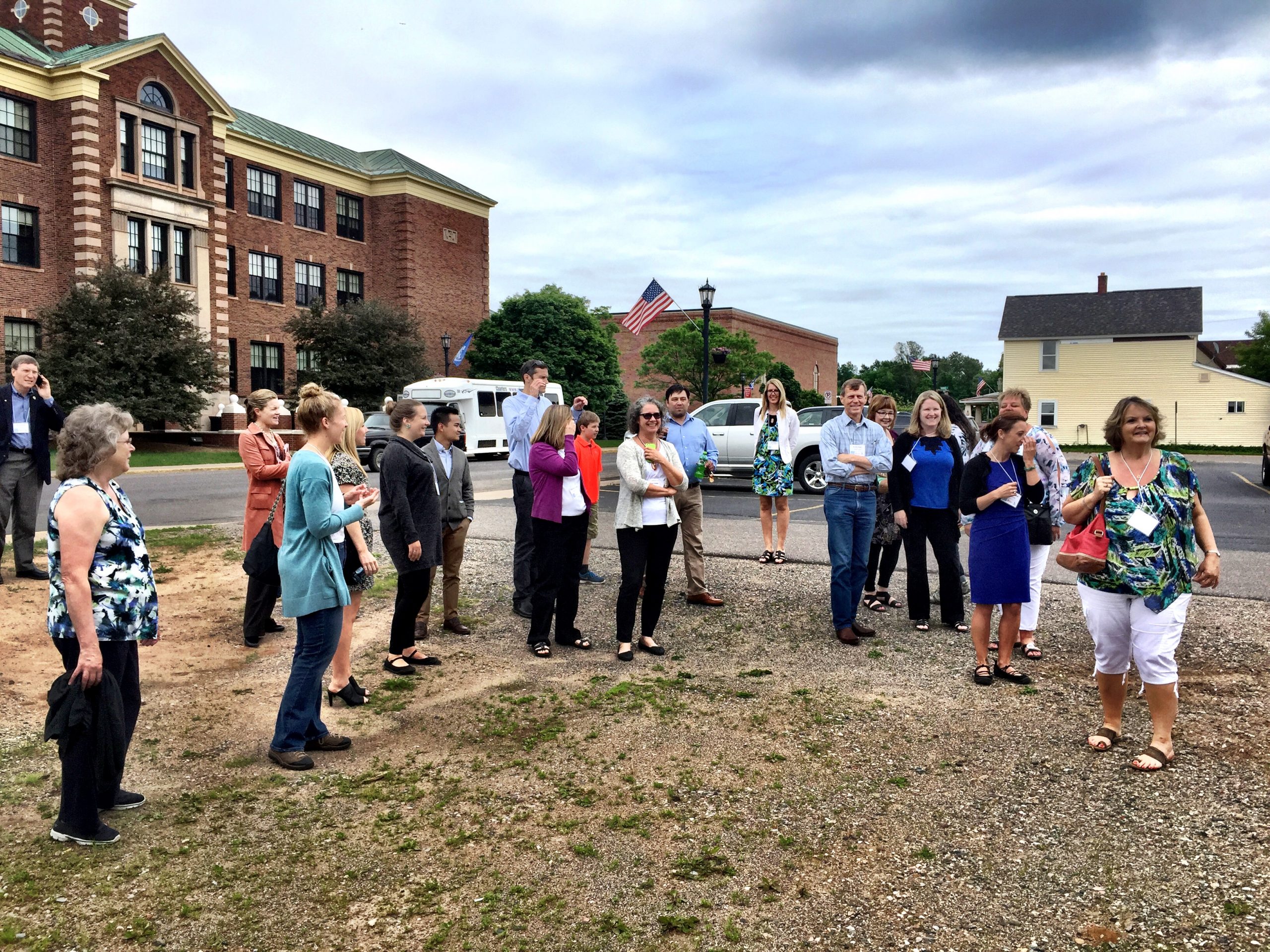Topic(s): Land Banks
Bringing Michigan’s land bank leaders together in rural Marquette County
July 18, 2016


Houses in Marquette (Credit: Laura Settlemyer for Community Progress)
Land bank leaders gathered in Marquette, Michigan, last month, on June 13-14th, for the third annual Michigan Land Bank Leadership Summit. The event drew over 40 participants, representing over 20 land banks. This year, the Michigan Association of Land Banks also invited participants from counties interested in starting a land bank to join the discussion to learn more about how to build a land bank around their communities’ needs.
The invite-only event offered participants the opportunity to dive deeper into the common challenges they face and spend more time engaged in direct peer-to-peer learning. The field of land banking is well established in Michigan, and the annual summit offers land bank leaders an opportunity to grow even more sophisticated and better connected to the work taking place across the state. This year, sessions and conversations focused on the importance of marketing the value of land banks, the need for effective leadership and reliable funding to support land bank work, and strategies for moving beyond demolition.
“We can’t demo our way to prosperity. We need to talk about redevelopment as well,” said Mary Balkema, President, Michigan Association of Land Banks (MALB), kicking off the event. Land bank leaders from Benzie, Calhoun, Genesee, and Gogebic Counties presented programs and stories on ways they have maintained lots after demolition and rehabilitated structures to avoid demolition. The Calhoun County Land Bank, for example, partners with local fire departments to use vacant properties to train firefighters. Detroit Future City presented its Field Guide to Working with Lots and how the tool can be a resource for many land banks that are dealing with an increasing inventory of vacant lots as a result of weak demand or a rise in demolition.

Photos of revitalization project in Ishpeming (Credit: Laura Settlemyer for Community Progress)
Land bank leaders agreed that often the best place to start with education and outreach efforts is with land bank board members to ensure they understand the powers and value of the land bank in a community and the need for effective leadership of the land bank. Land bank leaders from Ingham, Berrien, and Marquette Counties emphasized that having an educated and effective board can boost efforts to obtain funding to support land bank work.
Leaders from the Detroit, Kent County, and Kalamazoo County Land Banks led a group discussion on defining land banks’ value through public relations and marketing. Even after ten years of land bank work in Michigan, stakeholders from legislators to block clubs often have a poor sense of why land banks were formed, how they are funded, and why they are needed. Land bank leaders discussed the importance of effectively using public relations and other communication tools to share their stories and explain the value they provide to their communities. The Kalamazoo County Land Bank highlighted the success of hosting community celebrations when a new project is completed—doing so creates a stronger connection between the land bank and the community. The Kalamazoo County Land Bank also stressed the importance of community input at every stage of the redevelopment process.
Land bank leaders agreed that often the best place to start with education and outreach efforts is with land bank board members to ensure they understand the powers and value of the land bank in a community and the need for effective leadership of the land bank. Land bank leaders from Ingham, Berrien, and Marquette Counties emphasized that having an educated and effective board is often necessary to obtain funding to support land bank work.
Hosting the event in Marquette allowed many of the smaller and more rural county land banks to attend. The smaller land banks—measured either by inventory size, number of staff, or both—presented their successes and challenges alongside land banks representing larger, urban communities, including Detroit, Flint, Lansing, Grand Rapids, and Kalamazoo. The land banks with smaller inventories and smaller staff numbers demonstrated that a land bank can be an effective community redevelopment tool whether the inventory is 100,000 or 5 or whether staff numbers over 100 or 1.
MALB led a discussion on strategies and goals for the association and land banks across the state working together to pursue continued advocacy, education, technical assistance, and network building MALB is crucial to ensure land banks in Michigan are able to build, manage, and sustain effective land bank programs.
The 2016 Michigan Land Bank Leadership Summit was hosted by Anne Giroux (Marquette County Treasurer, Land Bank Board Chair, and MALB Secretary), MALB, and the Center for Community Progress, with support from MSHDA (Michigan State Housing Development Authority), LISC (Local Initiatives Support Corporation), and Bierlein Companies, Inc.

Participants at Learning Exchange (Credit: Laura Settlemyer for Community Progress)
Following the summit, over 20 land bank leaders stayed an extra afternoon to participate in the 2016 Land Bank Learning Exchange co-hosted by MALB and Community Progress and featuring the work of the Marquette County Land Bank Authority. The learning exchange is an annual MALB event that provides an opportunity for land bank leaders to visit a land bank in the state, tour the projects the land bank has implemented, and hear an in-depth overview on how the land bank implemented those projects. Participants toured the K.I. Sawyer Air Force Base, where land bank partners are working to rehab residential units, and met with the director of Ishpeming High School’s Industrial Arts Program as well as many other sites across Marquette County and within downtown Marquette.
As Mary Balkema has written, “Land banking has been a very successful tool in Michigan to help revitalize distressed communities. The tool operates very differently in Marquette than in Detroit, but nevertheless, the tool is very important to community development.”
Subscribe to join 14,000 community development leaders getting the latest resources from top experts on vacant property revitalization.
